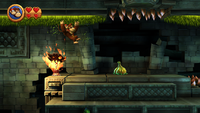Cling: Difference between revisions
No edit summary |
No edit summary |
||
| Line 1: | Line 1: | ||
[[File:Button Bash DKCR.png|thumb|200px|Donkey Kong clinging to grass growing out of the ceiling in [[Button Bash]]]] | [[File:Button Bash DKCR.png|thumb|200px|Donkey Kong clinging to grass growing out of the ceiling in [[Button Bash]]]] | ||
'''Clinging'''<ref>{{cite|date=2010|author=Nintendo|publisher=Nintendo of America|language=en-us|title=''[[Donkey Kong Country Returns]]'' instruction booklet|page=14}}</ref> | '''Clinging'''<ref>{{cite|date=2010|author=Nintendo|publisher=Nintendo of America|language=en-us|title=''[[Donkey Kong Country Returns]]'' instruction booklet|page=14}}</ref> appears in ''[[Donkey Kong Country Returns]]'' and [[Donkey Kong Country Returns 3D|its port]] as a usable move of [[Donkey Kong]]'s (and [[Diddy Kong]]'s in co-op play). When the player [[jump]]s at [[climbing grass|grass]] growing from of a ceiling or wall and holds {{button|wii|Z}} or {{button|wii|B}} (or {{button|wii|1}} with the [[Wii#Wii Remote|Wii Remote]] alone), Donkey Kong clings to the grass. While clinging, Donkey Kong can climb up walls and across ceilings in order to avoid obstacles below, usually [[pit]]s. However, the [[Kong]]s are still vulnerable to [[Chomp (Donkey Kong Country series)|Chomp]]s. [[Ground Pound|Ground-pound]]ing is still possible while clinging to grass. Clinging is also used in order to swing across vines or chains. This ability is prominently used during the [[Mangoruby]] boss fight. | ||
The move returns in ''[[Donkey Kong Country: Tropical Freeze]]'', where it has the same role. All four Kongs have the ability to cling. | The move returns in ''[[Donkey Kong Country: Tropical Freeze]]'', where it has the same role. All four Kongs have the ability to cling. | ||
Latest revision as of 17:34, July 4, 2024

Clinging[1] appears in Donkey Kong Country Returns and its port as a usable move of Donkey Kong's (and Diddy Kong's in co-op play). When the player jumps at grass growing from of a ceiling or wall and holds ![]() or
or ![]() (or
(or ![]() with the Wii Remote alone), Donkey Kong clings to the grass. While clinging, Donkey Kong can climb up walls and across ceilings in order to avoid obstacles below, usually pits. However, the Kongs are still vulnerable to Chomps. Ground-pounding is still possible while clinging to grass. Clinging is also used in order to swing across vines or chains. This ability is prominently used during the Mangoruby boss fight.
with the Wii Remote alone), Donkey Kong clings to the grass. While clinging, Donkey Kong can climb up walls and across ceilings in order to avoid obstacles below, usually pits. However, the Kongs are still vulnerable to Chomps. Ground-pounding is still possible while clinging to grass. Clinging is also used in order to swing across vines or chains. This ability is prominently used during the Mangoruby boss fight.
The move returns in Donkey Kong Country: Tropical Freeze, where it has the same role. All four Kongs have the ability to cling.
Names in other languages[edit]
| Language | Name | Meaning |
|---|---|---|
| French | S'agripper[2] |
Cling |
| Spanish | Trepar[3] |
Climb |
References[edit]
- ^ Nintendo (2010). Donkey Kong Country Returns instruction booklet. Nintendo of America (American English). Page 14.
- ^ Nintendo (2010). Donkey Kong Country Returns instruction booklet. Nintendo of America (French). Page 36.
- ^ Nintendo (2010). Donkey Kong Country Returns instruction booklet. Nintendo of America (European Spanish). Page 58.